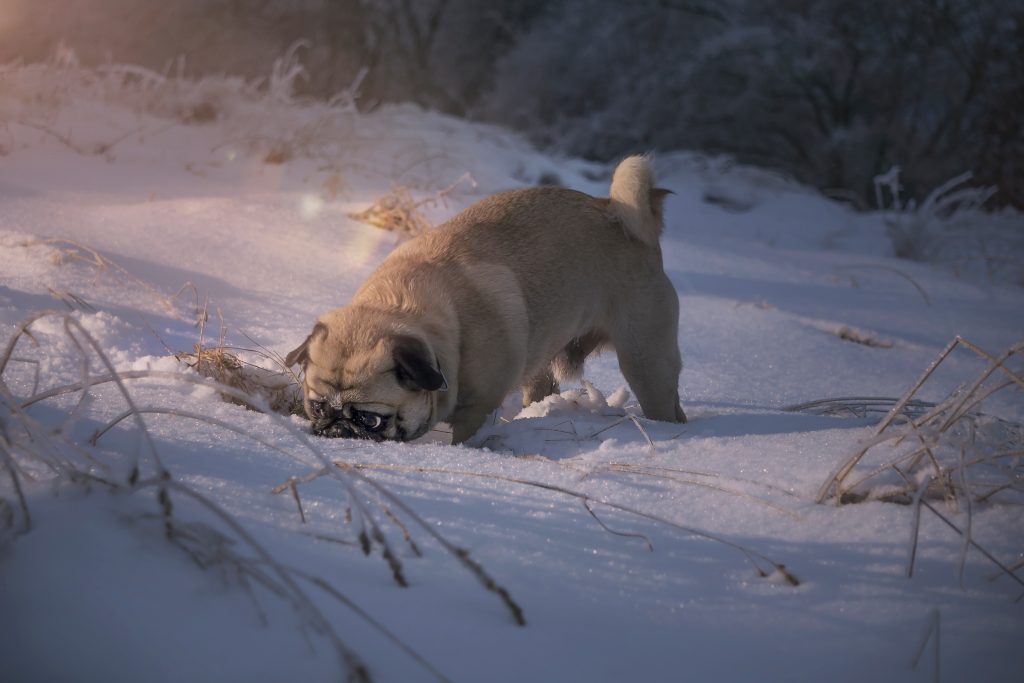If you have a dog and have not observed this behavior, consider yourself lucky! It is unpleasant. It is repulsive. It is downright nasty. Coprophagia – the consumption of feces. That’s right, dogs eat poop! Sometimes their own poop; sometimes the poop of another.
It is not always easy to discern exactly why your dog is doing this, but there are a few reasons it could be happening.
Scavenging
When a dog consumes the feces of another animal, such as eating from the cat litter box, it could simply be the result of their exploratory, scavenging nature. Dogs are adaptive carnivores and they have an instinct to scavenge for food. They tend to eat what they find, whether that may be fresh prey, leftover carcass, compost or feces. These diet choices may seem gross to us, but to a dog, these things are delicious.
Cleaning
If a dog consumes the feces of another dog, this may be due to the maternal instinct to consume the excrement of young puppies, as a “cleaning” behavior. This behavior may also occur in some hunting breeds as they have a strong instinct to cover up their scent (this instinct also leads to rolling around in feces). Some rescue dogs that have been confined to small, unclean spaces develop the habit of cleaning up after themselves as they prefer a clean “den” to sleep in; they may continue this habit in their new home, even though they have a clean space to sleep.
Nutritional
There are a couple of nutritional causes of coprophagic behavior in dogs.
Nutritional deficiency:
If a dog’s diet does not contain enough nutrients to meet their requirements, the instinct to scavenge is heightened and dogs will attempt to acquire nutrition from any source they can, including feces and garbage. Even if minimum nutrient requirements are fulfilled, a dog may not feel full if the nutrient balance isn’t right for them. Higher protein and fat will help a dog feel more satiated than fiber or other carbohydrates.
Gut microflora imbalance:
Probiotic bacteria must come from the environment. If a dog has an unhealthy gut or an imbalance in the microbial population of the gut (not enough good bacteria or too much bad bacteria), the dog may be driven to consume grass, dirt or feces to acquire beneficial gut microbes. In the winter months, the environment is mostly frozen and so there are limited sources of probiotics, prompting dogs to munch on poopsicles!
The microbial balance may be disrupted for several reasons. Poorly digested food has a negative impact on gut health – undigested protein and starch feed problematic bacteria strains in the gut while undigested fat inhibits the function of helpful bacteria. Poor quality food, improper nutrient balances or damage to the gut can reduce digestion of nutrients. Beneficial microbes can also be disrupted by antibiotics or parasite infections, as well as environmental irritants that dogs ingest unintentionally.
What can be done?!
When it comes to scavenging or cleaning, the solution is training, supervision and timely pick-ups. Dogs can be trained out of this behavior, but the most effective solution is keeping a close watch and preventing access. Cat litter boxes should be kept away from the dog and feces in the yard should be picked up immediately.
In the case of a nutritional deficiency and problems digesting food, a diet change might be the solution. Choose nutrient dense formulas made with high quality ingredients that do not require a high feeding volume. Feed only what is required to maintain ideal body weight and avoid over-feeding.
Probiotic supplements are a great way to quickly replenish healthy microflora populations. These supplements can be used in conjunction with a diet change or can be added to the current food.
If you are experiencing this issue and need more information or guidance, visit your local Global Pet Foods and speak to the knowledgeable staff!












